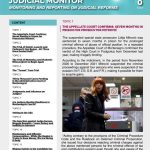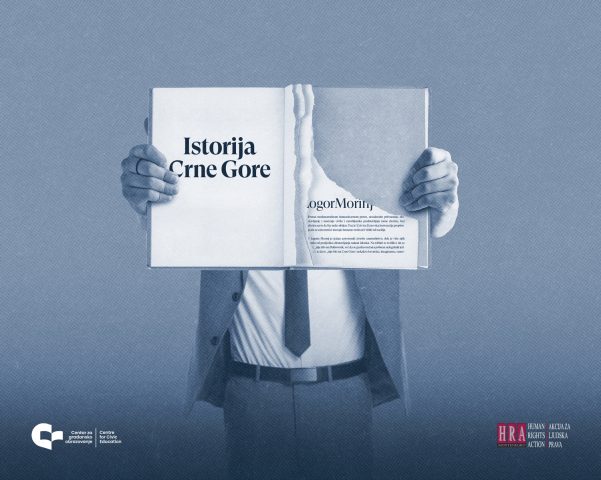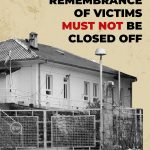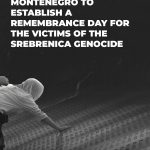
Number 8: Judicial Monitor – Monitoring and Reporting on Judicial Reforms
07/06/2025
THE TRIAL OF SLOBODAN PEKOVIĆ FOR WAR CRIMES AGAINST THE CIVILIAN POPULATION IN BiH CONTINUES
15/06/2025DENYING WAR CRIMES IS A THREAT TO PEACE AND TO MONTENEGRO’S EUROPEAN FUTURE

Human Rights Action (HRA) and Centre for Civic Education (CCE) assess that the public panel discussion “Collection Centre – Morinj: Historical Manipulation (Zoran Gopčević – Not a War Criminal)”, held on 7 June 2025 in the Boka Cinema Hall, represents an attempt at historical revisionism and relativization of war crimes committed during the 1990s on the territories of Montenegro and Croatia.
Denying and justifying war crimes is not patriotism – it is an offence to victims, a denial of facts, and a threat to peace. When such messages are sent from public events, they normalize the dangerous idea that denying crimes is acceptable. This attitude toward the past harms future generations and slows Montenegro’s EU integration path, further deepening divisions in society.
CCE and HRA point out that during this panel, the nature of the Morinj camp was disputed, with claims that “a crime exists only if there are deaths or permanent injuries,” and the conclusion that “being in the camp was unpleasant, but not a crime.” These statements contradict historically and judicially established facts. The Morinj camp, referred to in the indictment as the Morinj Collection Centre, was established by the Yugoslav People’s Army (JNA) near Kotor and operated from October 1991 to August 1992. During that time, around 270 Croatian citizens, half of whom were civilians, were detained and abused there. The High Court in Podgorica concluded that “an atmosphere of terror and fear for bare life prevailed in the Morinj Collection Centre, to which the victims were continuously exposed,” and that detainees – both civilians and prisoners of war – were systematically tortured and humiliated. Four individuals were convicted for war crimes against prisoners of war, and Montenegro, in addition to criminal prosecution, also acknowledged responsibility by paying compensation – a total of 1.430.000 EUR to about 200 victims since 2017.
According to international humanitarian law, unlawful detention, abuse, and torture of civilians and prisoners constitute war crimes, regardless of whether someone was killed. The Third and Fourth Geneva Conventions stipulate that detainees must be treated humanely and protected from violence. In the Morinj camp, one detainee committed suicide, and several others died from abuse-related consequences after their release.
At the panel, it was also claimed that in 1991 “no attack on Dubrovnik occurred, but rather an armed rebellion of illegal units was being suppressed” and that this “was not a war between Montenegro and some Croatian, imaginary, self-proclaimed, illegal entity, but a war of a sovereign state called the SFRY,” with assessment that Croatia “was not a victim of aggression” because “they were not a state.” However, in December 1990, Slovenian citizens voted for independence, and in May 1991, so did Croatian citizens. Both states were soon internationally recognised as independent and sovereign. There was no decision by the legitimate SFRY Presidency – the only constitutional body with authority over the military – to deploy the JNA in Croatia, as the presidency was blocked and non-functional. Without a quorum, no legitimate or binding decisions could be made. At the time of the attack on Croatia, the SFRY de facto no longer existed, and the JNA had already withdrawn from Slovenia following ten days of equally senseless and unjustified warfare. The logic used to justify these attacks is the same as the one that could be used to justify an attack on Montenegro following its own independence referendum.
One statement made at the event was that the late Zoran “Džimi” Gopčević, a celebrated water polo player and head of security at the Morinj camp, had been publicly shamed “only for honourably doing his job.” However, defenders of Gopčević’s legacy ignore the fact that his role in the Morinj camp casts a shadow over all his sports and other achievements. Unlike some guards, such as Mladen Proročić, who were publicly praised by former detainees for their humane treatment, Gopčević is not remembered in the same way. We regret that he passed away before his responsibility could be legally examined in court.
Particularly concerning is the fact that the public institution “Nikola Đurković” Cultural Centre, under whose authority the Boka Cinema operates, provided the venue for an event of an evidently revisionist nature, which was already clear from its title. Further disturbing was the attendance of the President of the Kotor Municipal Assembly, Maja Mršulja, and the Secretary for Investments, Ognjen Vukasović, a member of the Democrats, a party that has vice-presidents and ministers in the Government of Montenegro. Unfortunately, this indicates that historical revisionism is being institutionally endorsed, which seriously undermines the process of necessary objective confrontation with the past.
Human Rights Action (HRA)
Centre for Civic Education (CCE)







 English
English